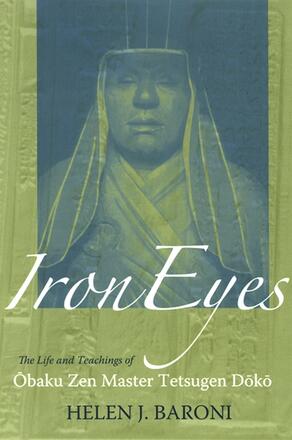
Iron Eyes
The Life and Teachings of Ōbaku Zen Master Tetsugen Dōkō
Alternative formats available from:
Looks at the contributions of a major figure in Buddhism and provides translations of his writings.
Description
Iron Eyes focuses on the Japanese Zen master Tetsugen Doko (1630–1682), the best-known exponent of Ōbaku in Japan and the West. Ōbaku Zen arose during the seventeenth century and became the third major Zen sect in Japan. Ōbaku monks encouraged the laity to deepen their knowledge of and commitment to Buddhism. Tetsugen is credited with producing the first complete wood block edition of the Chinese Buddhist scriptures in Japan. Legend has it that Tetsugen had to raise the money for the project three times: twice his great compassion led him to give away the money he had raised to the starving victims of natural disasters. This Zen story is well-known in Japan and has gained popularity among contemporary Buddhists in the West. The first part of this book offers an introduction and a series of analytical chapters describing Tetsugen's life, work, and teachings, as well as the legends related to him. The second part comprises annotated translations of his major teaching texts, important letters and other historical documents, a selection of his poetry, and several traditional biographies.
Helen J. Baroni is Associate Professor of Religion at the University of Hawaii at Manoa and the author of Ōbaku Zen: The Emergence of the Third Sect of Zen in Tokugawa Japan and The Illustrated Encyclopedia of Zen Buddhism.
Reviews
"…Baroni provides the first critical examination of Tetsugen's life and teachings in English, as well as translations of a range of his sermons, poetry, and letters … Her work not only brings to light an important figure in Japanese Buddhist history, but it also adds to a growing body of academic literature in English on Tokugawa period (1600–1868) Buddhism." — Japanese Journal of Religious Studies
"We still tend to compartmentalize realms of thought and practice, and it is about time that the almost exclusively Buddhist picture that is painted here is juxtaposed with that of, say, Kumazawa Banzan or Ito Jinsai to see what might emerge. The task is daunting but is made easier year by year with the emergence of finely focused studies such as this one of Baroni's. Another part of the jigsaw has been filled in and filled in well." — Monumenta Nipponica
"Well researched and clearly written, Iron Eyes provides a thorough and insightful examination of Tetsugen Doko. The author is the only expert specialist in the subfield of the Ōbaku school, and she makes a significant contribution to the burgeoning fields of Tokugawa intellectual history, religious thought, and Buddhist studies." — Steven Heine, author of Dogen and the Koan Tradition: A Tale of Two Shobogenzo Texts